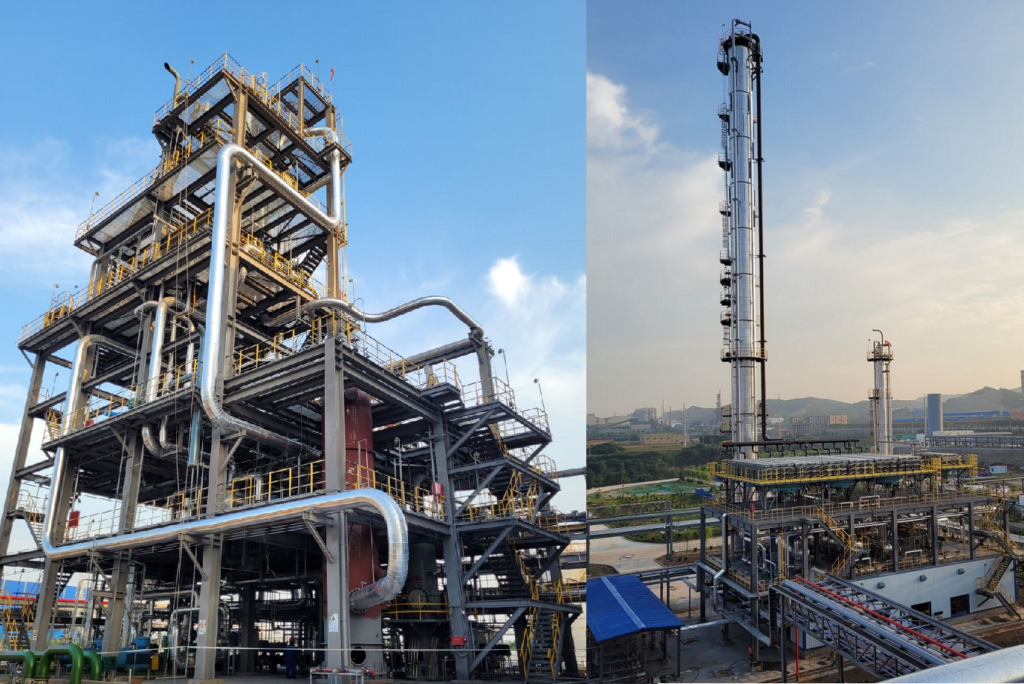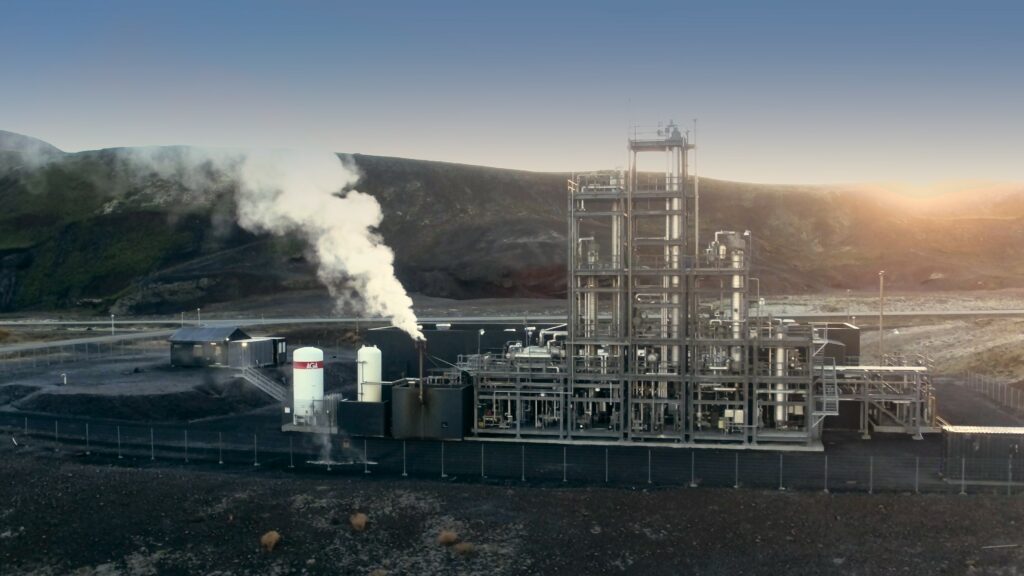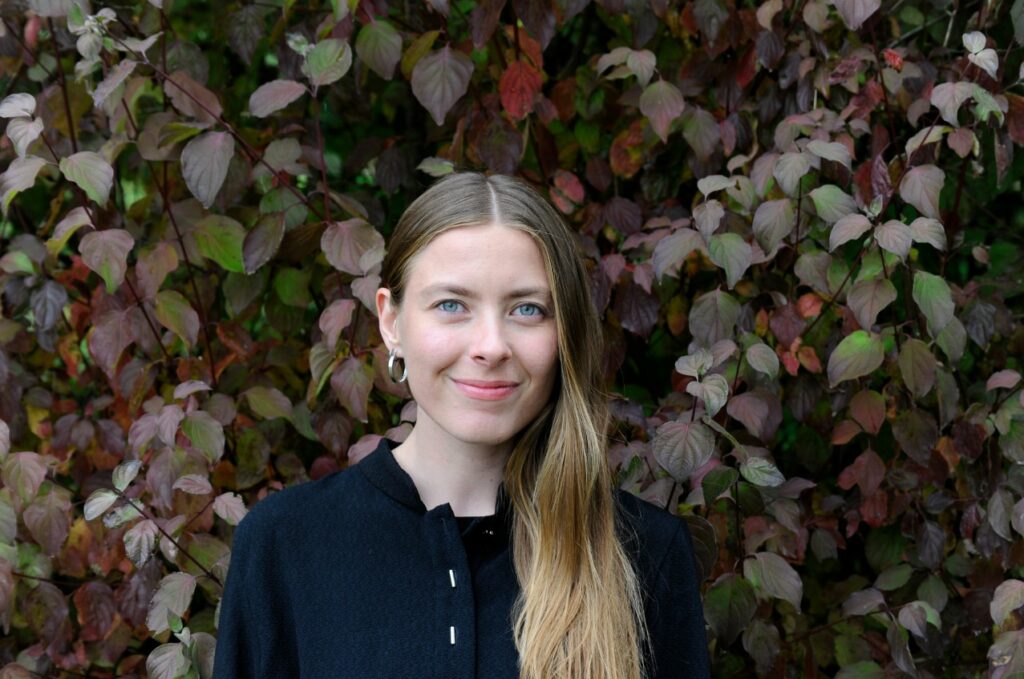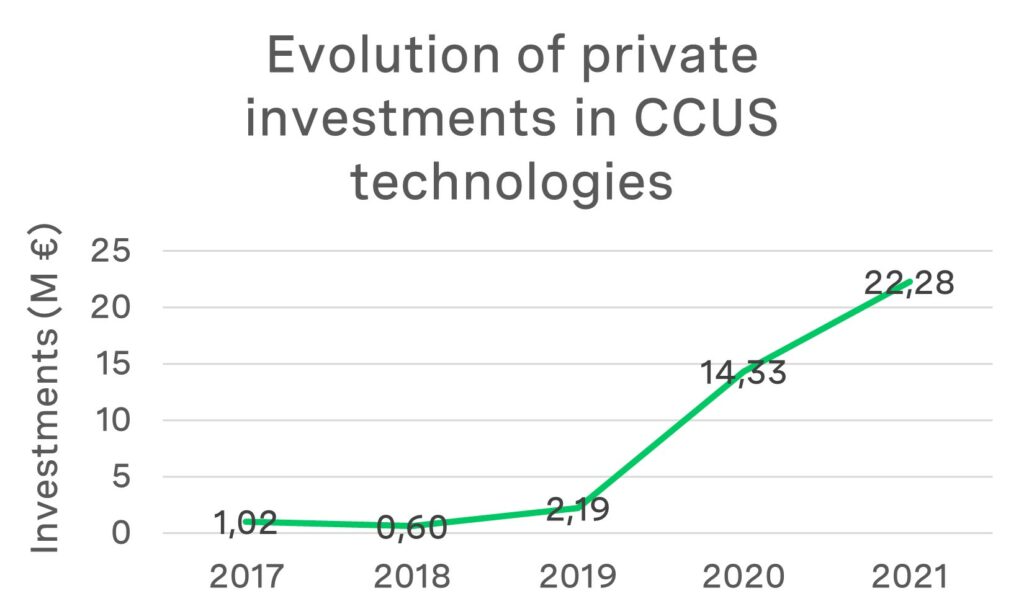27.10.2022 | Insight
Icelandic cleantech company Carbon Recycling International has recently commissioned the world’s first commercial CO2-to-methanol plant. With an annual recycling capacity of 160,000 tonnes of CO2, the Shunli plant in China will be the largest of its kind. Nefco is among the CRI stakeholders that have provided all-important patient capital for the scale-up of the technology, identified as essential in reaching net-zero emissions by 2050.

IPCC highlights carbon capture, utilisation and storage
The latest report from the Intergovernmental Panel on Climate Change (IPCC) highlights carbon capture and storage (CCS) and circular material flows, including carbon capture, utilisation and storage (CCUS), as vital for meeting global energy and climate change goals, not least when it comes to abating process emissions from steel and cement production and other major emissions sources that are difficult to eliminate or electrify. Yet, according to the International Energy Agency (IEA), annual investment in CCUS has never accounted for more than 0.5 per cent of global investment in clean energy and efficiency technology.
“We live in a carbon-based society, predominantly built on fossil-based carbons, which must be replaced,” says Björk Kristjánsdóttir, CEO of Carbon Recycling International (CRI).

CRI has developed a patented technology that captures CO2 emissions and exposes them to a chemical reaction with hydrogen to produce green or low-carbon liquid methanol. The technology can be used with all CO2 sources, including liquid CO2 and, eventually, carbon from direct air capture. In 2017, Nefco provided CRI with a grant for a feasibility study into the Shunli project through Nopef, the Nordic Project Fund, followed two years later with a loan for the scale-up of the technology and international expansion of CRI. In 2021, the loan was converted into equity, and Nefco became a shareholder in CRI.
“Our proprietary technology reduces CO2 in the atmosphere and produces valuable outputs at the same time,” says Kristjánsdóttir. “Methanol can replace fossil fuels and chemicals based on coal and gas production. Furthermore, it’s an excellent carrier of green hydrogen, which is an increasingly important alternative to fossil fuels. One of the key benefits of liquid methanol is its compatibility with current fuel infrastructure.”
Shunli plant will offset 7 million tonnes of CO2
In 2012, at the George Olah Renewable Methanol Plant in Svartsengi, Iceland, CRI became the first company in the world to achieve industrial-scale fuel production from CO2. The demonstration plant initially had an annual production capacity of 1,300 tonnes of methanol, which was later scaled up to 4,000 tonnes.
Recently, CRI has reached another major milestone with the first commercial deployment of its patented Emissions-to-Liquids technology (ETL). The Shunli plant in Anyang City in China will capture emissions from a coke oven and gas production facility that produces raw materials for steel production. According to the EU Commission, the steel industry is responsible for about 5 per cent of CO2 emissions in the EU and 7 per cent globally.

“Nefco’s investment came at a crucial time for CRI, in the trying months leading up to our first commercial sale,” says Kristjánsdóttir. “We were in the middle of the pandemic, which caused delays in signing the first contract. With technology like ours, financing is key: you need patient investors to enter the market and deploy the technology commercially.”
The Shunli plant will recycle up to 160,000 tonnes of CO2 annually, which is equivalent to taking more than 60,000 cars off the road. It will also produce about 110,000 tonnes of low-carbon methanol – over 25 times more than the pilot plant in Iceland. The plant’s methanol production is combined with the separation of methane for liquid natural gas production, making it a profitable business model for the client. In China, the payback time of the investment can be as short as 3-5 years.
“The methanol will be used locally in China, replacing methanol currently produced with coal,” says Kristjánsdóttir. “Taking that into account, the plant can offset 360,000 tonnes of CO2 annually, or more than 7 million tonnes over its twenty-year design lifetime.”
The Shunli plant will recycle up to 160,000 tonnes of CO2 annually, which is equivalent to taking more than 60,000 cars off the road.
Important investment for Nefco
Nefco’s investment in CRI was one of the first under its renewed global mandate, introduced in 2018, which has enabled the institution to invest in the global scale-up of Nordic technologies. CRI’s technology also fits well with Nefco’s strategy for 2021-25, Ready to risk for green. The strategy identifies sectors of particular interest to Nefco, characterised by high Nordic competence and speed of innovation, in which projects have the potential to provide global benefits when implemented on a large scale.
“We prioritise technologies with high demonstration value, notably commercially proven solutions that require capital for international scale-up.” – Mikael Reims, Nefco
Nefco only finances projects that have a positive impact on the environment and climate. All of its investments are assessed based on its own environmental and sustainability criteria and the new EU taxonomy for sustainable activities. Moreover, the investments are closely aligned with the Nordic countries’ environmental policies.
“Our involvement in CRI has been important to us not only in terms of the technology but also in establishing our role under the renewed mandate,” says Mikael Reims, VP of Origination at Nefco. “We want to invest in companies in which we can play an important role in the initial scale-up and growth journey. Therefore, we prioritise technologies with high demonstration value, notably commercially proven solutions that require capital for international scale-up.”
Successful commercialisation of CRI’s technology
With that in mind, Nefco’s investment in CRI can only be described as a success. In 2021, CRI signed a second commercial agreement to design a CO2-to-methanol plant for Jiangsu Sailboat Petrochemicals on the eastern coast of China. Here, the methanol will be used to produce polymers and plastics, recycling 150,000 tonnes of carbon dioxide per year and delivering indirect emissions savings of 330,000 tonnes by reducing the use of coal-based methanol.
“The Sailboat project is our first in the PDH industry,” says Kristjánsdóttir, adding that the project is motivated by strict demands from the Chinese Government to reduce industrial emissions. “Hydrogen is a by-product of the on-site production of propylene, which is the main ingredient in common types of plastics.”
In addition, CRI has partnered with the Norwegian company Statkraft to develop the largest e-methanol plant in Europe. The 120 MW green hydrogen plant will source emissions from the Finnfjord Ferrosilicon plant in northern Norway, which has set itself the goal of becoming the first carbon-neutral production facility in the sector. In Finnfjord, the hydrogen will be generated via the electrolysis of water using renewable electricity.
“We live in a carbon-based society, predominantly built on fossil-based carbons, which must be replaced.” – Björk Kristjánsdóttir, CRI
Plenty of room for additional cleantech investment
According to Cleantech Scandinavia, only a small share of private cleantech investment in the Nordic Region goes to companies developing CCS and CCUS technology. The organisation publishes an annual report on private cleantech investment trends in the Nordic Region.
“In 2021, we recorded investments of EUR 5.8 billion in Nordic cleantech,” says Innovation and Research Analyst Aziliz Le Rouzo. “However, only EUR 22 million went to companies that work with CCS and CCUS, representing a mere 0.5 per cent of total cleantech investment. In terms of the amounts invested, the largest share of private cleantech investment over the last five years has gone into energy storage, energy generation and transportation and logistics.”

Le Rouzo describes the Nordic CCS and CCUS market as being in the early stages, with a limited number of companies exploring new technologies and market opportunities. Of those, only very few have reached commercialisation. However, Cleantech Scandinavia has observed growing momentum during the last three years, with more companies emerging in this technology field. According to Le Rouzo, the trend will likely continue with the increasing emphasis on CCS and CCUS by the IPCC and the International Energy Agency.

“What’s interesting is the variety of technologies and methods to store and utilise carbon,” she says. “We see companies like CRI and Soletair Power, which produce synthetic fuels from CO2, we have examples of technologies that produce bioenergy from captured carbon, and then there is Carbfix in Iceland, which injects carbon into the soil and turns it into stone within two years. Furthermore, we have several companies in Norway exploring the possibilities of storing captured carbon in old gas reservoirs at the bottom of the ocean.”
In 2021, we recorded investments of EUR 5.8 billion in Nordic cleantech. – Aziliz Le Rouzo, Cleantech Scandinavia
New opportunities for green investments
Regarding investments in CCUS and other innovative environmental technologies, Mikael Reims highlights the benefits of being able to first provide grants for feasibility studies and then investing in the scale-up of technologies with international potential. The support enables Nordic companies to further develop and refine their projects and lays the foundation for further financing at later stages.
“We’re able to provide soft money to assess new markets, and then we can offer commercial financing for companies that proceed with their international expansion,” Reims says. He adds that when it comes to projects with documented environmental benefits, Nefco is positioned to take more risk than most other financiers. “When these technologies have become more established, commercial banks can provide greater financing, all with the certainty that we’ve done our due diligence on the company, the technology and the environmental impact.”
For further information, please contact:
Mikael Reims, Vice President, Origination
mikael.reims@nefco.int, +358 10 6180 670
Learn more about our financing options and contact us
Loans and equity-type funding – Investments on global markets
Growth financing for SMEs going global